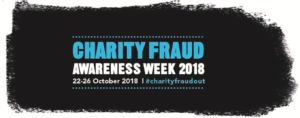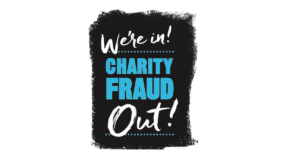Charity Fraud Awareness Week – Let Us Show You How
Day 4
All this week we are supporting Charity Fraud Awareness Week by sharing great advice and resources provided by organisations such as the Fraud Advisory Panel and the Charity Commission. We are also running our ‘Let us show you how’ campaign each day this week.
What does this mean?
Each day there will be great content and resources with some great advice – we are going to ‘show you how’ to convert that in to practical action that does not require any prior knowledge of managing fraud risks. We will ‘show you how’ you can integrate effective fraud risk management into your other risk management processes, compliance programs and operational procedures.
Each day we will provide a 5 minute digest to prompt discussion and challenge organisations to identify an action they are going to take to move things forward. By the end of the week you will therefore have 5 practical things you have pledged to do. If you choose to share those with us we can also send you a reminder each quarter to check how you are getting on.
Day 4 – Insider Fraud and Whistleblowing
There is some more great guidance provided by the Charity Commission and Fraud Advisory Panel including checklists and e-learning. As with our previous posts we are not going to simply repeat those, but instead add our own perspective, provide practical resources and seek inspiration from other sectors.
Our Top Tips
As the Charity Commission e-learning states, insider fraud can be committed by trustees, staff or volunteers. It is therefore important to consider all of these actors in any risk assessment. When looking at the potential impact of a fraud by these different types of ‘insider’ it is useful to remember that each type can have different financial and reputational impacts. A whistleblowing policy also has to take account of the fact that junior members of staff may need to raise concerns about senior staff and trustees.
According to the Association of Certified Fraud Examiners (ACFE) State of the Nation Report 2018:
- Senior members of staff committed fewer frauds by number but each fraud was of much greater value than those committed by more junior staff (lower likelihood but higher impact).
- Bribery and Corruption were amongst the most common issues.
- The longer the fraudster had worked for an organisation the greater the value of the fraud.
- 85% of insider fraudsters displayed at least one behavioural red flag, making it important that all staff are aware of these flags and know what to do if they suspect fraud.
- Only 4% of fraudsters had a prior conviction for fraud.
- Data analytics and surprise audits resulted in a reduction in losses of more than 50% and corresponding quicker detection.
- Nearly a third of tip-offs came from people outside of the organisation making it important that reporting hotlines are available and communicated externally.
- Tip-offs were the most common way for frauds to be detected and those organisations that operated a hotline received proportionally greater tip offs.
- The top reason why organisations don’t make referrals to the police/regulator is the fear of bad publicity. As stated yesterday it will not always be appropriate to prosecute individual cases of fraud and it is important that charities have a plan for how they will investigate cases of suspected fraud. However prosecution of individual cases is not the only reason that charities should consider reporting fraud to the police. Such reports provide useful intelligence to the police who may be able to make connections between different cases in a global world. Our resource centre has an example Fraud Response Plan that can be edited and adapted to meet your specific needs.
According to the Kroll Global Fraud and Risk Report 2017/18 :
- The greatest year on year increase in incidents related to bribery and corruption. Information theft and executive conflicts of interest also showed significant year on year increases.
- 34% of executives cited ex-employees as being the perpetrators of frauds and 28% for cyber incidents.
You can also download our whistleblowing policy template, and a powerpoint explaining ‘why people commit fraud’ here.
How do I get more ‘Let Us Show You How’ information?
There a 3 easy ways:
- We will be posting updates on our website during fraud awareness week so simply visit our news feed each day, or
- Follow us on the usual social media platforms using the buttons at the top of the page, or
- Subscribe to our special mailing list using the contact form below and we will deliver the content direct to your mailbox each day.
What next?
Each day we also said we would challenge organisations to identify an action they are going to take to move things forward. By the end of the week you will therefore have 5 practical things you have pledged to do. If you choose to share those with us we can also send you a reminder each quarter to check how you are getting on. So what will you choose – one of the actions identified by the Charity Commission or perhaps communicate your whistleblowing procedures to donors and suppliers? The choice is yours….!
We will be liking and retweeting other posts so please join us in keeping #charityfraudout.
If you missed our previous posts we have Day 1 , Day 2, and Day 3
To get our daily updates all this week please sign-up to our special email below.




Comments are closed.